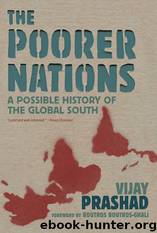The Poorer Nations: A Possible History of the Global South by Vijay Prashad

Author:Vijay Prashad [Prashad, Vijay]
Language: eng
Format: epub
ISBN: 9781844679539
Publisher: Verso Books
Published: 2013-07-03T07:00:00+00:00
TOKYO’S ROAD TO NOWHERE
The rise of Japan as a major economic power has far reaching implications and developing countries need to pay increasing attention to the possible role of Japanese capital, Japanese technology and the Japanese market in widening the developing options open to them.
Manmohan Singh, 198913
In 1945, Japan had been devastated. Four years later, under the shadow of the US occupation, the government created the Ministry of International Trade and Industry (MITI), whose 1950 directive, “Policy Concerning Industrial Rationalization,” set the path for Japan’s recovery.14 The state directed the large corporations, the zaibatsu or keiretsu (for example, Mitsui, Mitsubishi, and Sumitomo), to use resources towards a very particular set of ends, notably industrialization to develop an internal market and for export. The prime minister, Hayato Ikeda, pushed the banks to move money into the conglomerates, and eventually, through this massive state action, redeveloped the commanding heights of the economy. Japan’s Gross Domestic Product (GDP) skyrocketed, reaching just under $1 trillion in 1965. Creative accounting and administrative guidance from the state enabled the keiretsu to draw large profits and create a pact with the workers through reasonable wages and lifelong employment.15 It was not paradise, but it was not the ruins of Hiroshima.
By the early 1970s, creeping inflation and the oil shocks had disturbed the political class.16 Japan relied entirely on imported oil and had few reserves of other energy sources. Most of the oil came from the Gulf region. OPEC’s 1973 thrust scared Japan. The Japanese government feared that its too-close relationship with the US might narrow its options. In the MITI, the government created an Agency for Energy and Natural Resources. The Agency released a White Paper in September 1973, warning of calamity for Japan. MITI minister Yashuhiro Nakasone, later prime minister, pointed out, “It is inevitable that Japan will competitively follow her own independent direction”—namely, independent of the United States. “The era of blindly following has come to an end.” In June 1973, Nakasone wanted his government to forge a new resource policy “standing on the side of the oil producing countries.”17 In November the cabinet secretary, Susumu Nikaido, laid out a “new Arab policy,” specifying that the rights of the Palestinians must be recognized. This was as much a threat to Washington as it was to its ally, Israel.
Japan had its rebellion, but quickly came back to its best behavior. The ruling political and economic elite feared their dangerous neighborhood. A Soviet reconnaissance plane, the Tokyo Express, flew daily towards Japan. Japanese Communists and the wider left (especially the student left) exerted their pressure after the social uprisings of 1968.18 With the People’s Republic of China and North Korea in the frame, the Japanese ruling elite had a lot to worry about. As much as the occupation, these threats were the basis for the US-Japanese strategic alliance, which was therefore hard to shake. A nudge against Washington here and there was sufficient; it could go no further. For that reason, in September 1973, Japan’s foreign minister,
Download
This site does not store any files on its server. We only index and link to content provided by other sites. Please contact the content providers to delete copyright contents if any and email us, we'll remove relevant links or contents immediately.
| Elections & Political Process | Ideologies & Doctrines |
| International & World Politics | Political Science |
| Public Affairs & Policy | Specific Topics |
| United States |
The Secret History by Donna Tartt(19053)
The Social Justice Warrior Handbook by Lisa De Pasquale(12187)
Thirteen Reasons Why by Jay Asher(8894)
This Is How You Lose Her by Junot Diaz(6877)
Weapons of Math Destruction by Cathy O'Neil(6267)
Zero to One by Peter Thiel(5787)
Beartown by Fredrik Backman(5737)
The Myth of the Strong Leader by Archie Brown(5500)
The Fire Next Time by James Baldwin(5431)
How Democracies Die by Steven Levitsky & Daniel Ziblatt(5216)
Promise Me, Dad by Joe Biden(5142)
Stone's Rules by Roger Stone(5081)
A Higher Loyalty: Truth, Lies, and Leadership by James Comey(4954)
100 Deadly Skills by Clint Emerson(4921)
Rise and Kill First by Ronen Bergman(4780)
Secrecy World by Jake Bernstein(4741)
The David Icke Guide to the Global Conspiracy (and how to end it) by David Icke(4709)
The Farm by Tom Rob Smith(4502)
The Doomsday Machine by Daniel Ellsberg(4484)
